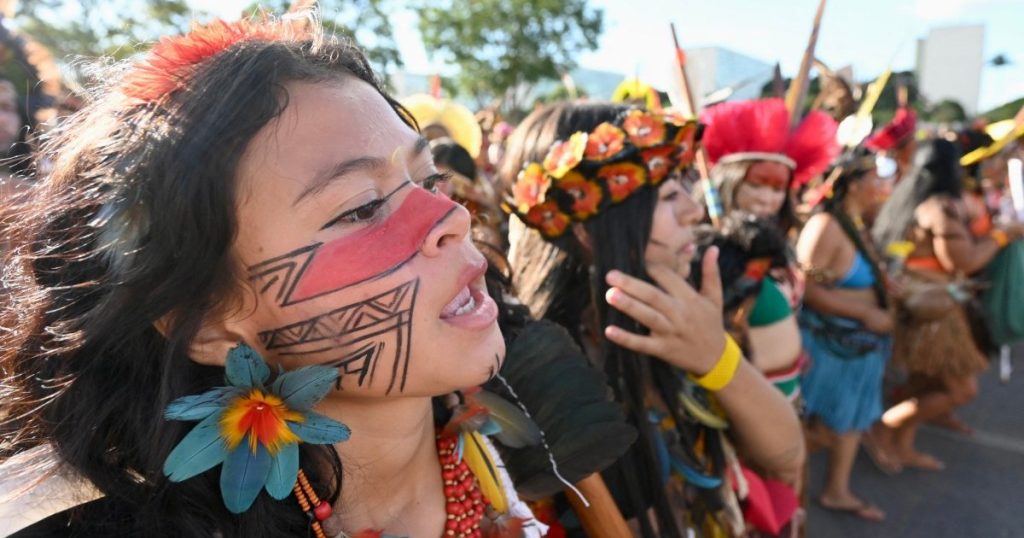Thousands of Indigenous people marched in Brazil’s capital, demanding the official recognition of lands they have inhabited for centuries and the protection of their territories from criminal activities such as illegal mining. Bearing posters with messages advocating for Indigenous rights, they gathered in Brasilia to march towards Three Powers Square, where Congress, the Supreme Court, and the Planalto presidential palace are located. Some Indigenous leaders entered the palace to speak with President Luiz Inacio Lula da Silva, while others protested outside, asserting that their rights are non-negotiable. The president recently faced opposition in creating four Indigenous territories, prompting criticism from various tribes.
In addition to land recognition, demonstrators also expressed concerns about a proposed 950km rail project to transport soybeans from Mato Grosso to ports along the Tapajos River in the Amazon. Leaders from the Kayapo, Panara, and Munduruku tribes stated that they were not adequately consulted and feared that the project would lead to increased deforestation. The rally in Brasilia marked the culmination of the annual Free Land Indigenous Camp, where Indigenous groups expressed disappointment in the government’s efforts to address their concerns. Marivelton Bare, head of the Rio Negro Federation of Indigenous Organizations, highlighted the political instability, lack of respect, and mistrust experienced by Indigenous communities.
President Lula, who began his third term in January, has created 10 Indigenous territories during his administration, although Indigenous leaders argue that this is insufficient. According to the Socio-Environmental Institute, there are at least 251 territories with pending claims for recognition by the federal government. Indigenous lands currently make up about 13 percent of Brazil’s territory, mostly located in the Amazon rainforest. While Lula’s efforts to demarcate Indigenous territories have been slower compared to previous administrations, they stand in stark contrast to the policies of his predecessor, Jair Bolsonaro, who vowed not to create any additional Indigenous land.
Despite Lula’s initiatives, Indigenous demands continue to face opposition, particularly from the powerful agribusiness sector, supported by numerous Congress members and governors. The Indigenous community argues that the government is using their rights as bargaining chips, and there is a sense of frustration and disillusionment with the lack of tangible progress. Indigenous leaders from the northwestern part of Brazil’s Amazon express disappointment in the current political climate and the unwillingness of authorities to adequately address their concerns. As Indigenous voices grow louder, there is a call for greater recognition and protection of their lands, as well as meaningful engagement with Indigenous communities in decision-making processes.
The Indigenous march in Brasilia sends a clear message to the government that Indigenous rights are non-negotiable, and that the protection of their lands and territories is paramount. As Indigenous communities continue to face threats from illegal activities and infrastructure projects that endanger their way of life, there is a growing urgency to address these issues and ensure the preservation of Indigenous cultures and traditions. With ongoing struggles for land recognition and environmental protection, Indigenous leaders are calling for greater solidarity and support from both domestic and international allies to advance their cause and uphold their rights. As the Indigenous movement in Brazil gains momentum, the fight for Indigenous rights and land preservation remains a critical issue in the country’s political landscape.


